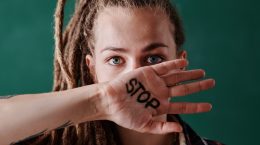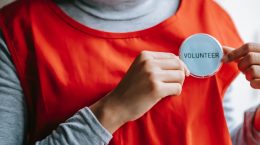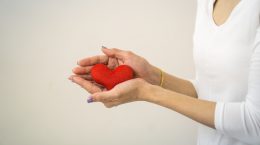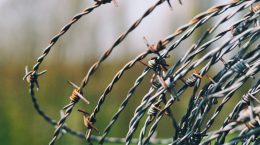Emotional burnout, stress, nervous tension and terrible stories – activists and volunteers have been going through this every day since August 2020. They help others, but to stay afloat and not go into depression, they need support. Realizing this, “Our House” organized psychological support for activists – conversations with psychologists take place in our voice chats in Telegram. What we talk about on them and what advice we give, read in our review.
In August 2021, Olga Karach visited Latvia, where she met with the Parliamentary Secretary of the Ministry of Foreign Affairs, Zanda Kalniņa-Lukaševica. Latvia was also represented at the meeting by the non-governmental organization “Centrs Marta” head, Iluta Lāce, and the political coordinator of “Centrs Marta”, Līva Matuzele. Earlier, “Centrs Marta” and “Our House” implemented a program of help to victims of human rights violations in Belarus after the elections (psychological, practical, legal, medical) funded by the Ministry of Foreign Affairs of Latvia. Nowadays, a new section, “Conversation with a psychologist”, where Latvian specialists participate, has been launched in the official Telegram channels of “Our House”. For convenience, we conduct a voice chat and publish a text recording of the broadcast with questions from listeners.
The first meeting took place on our channel on August 28, 2021. We talked with the director of the Skalbes crisis centre Raivo Vilcians and the head of telephone support for victims of crimes in Latvia, Santa Laimina. The topic of the voice chat is “How to provide yourself with emotional help in a difficult period.” Psychologists spoke about mental health, the ability to defend boundaries and look for resources inside.
“Often mental health problems occur due to rejection of failures. It is necessary to understand that failures in life are a normal process, a certain cycle. The presence of failures does not make anyone worse, so you need to learn to accept them and even love them. Only based on their adoption will we be able to take steps that can change our life cycle in the future, reduce the likelihood of repeated failures or prepare us,” the experts noted.
Mental health, psychologists clarified, strongly depends on the physical. To maintain physical health, you need to meet basic needs in time: eat, drink, go to the toilet, sleep – and also avoid unhealthy food, lack of water and sleep. “To improve physical health, it is not difficult to perform the following actions: walking, meditation, pleasant outdoor activities, exercises on proper breathing, inhaling pleasant smells, taking relaxing baths with scented candles. Under stress, it is useful to inhale your favourite fragrance. It is also useful to work emotionally: to communicate, to have a conversation with yourself. And be sure to find one thing that you are grateful for this day,” the experts advised.
“It is advisable to receive positive information (especially before going to bed), not to watch or listen to negative information. It is vital to communicate with family, friends, colleagues. It’s good when there are common needs and interests,” psychologists emphasize.
Psychological help for children is oftentimes ignored, believing that kids do not need it, but providing children’s emotional and social needs in crisis circumstances is very important. On September 3, 2021, we discussed this topic with the clinical psychologist, psychotherapist of cognitive behavioural therapy, lecturer at the Latvian Pedagogical University Inese Lapsina. At the beginning of the conversation, the psychologist noted that the healthy development of the child is provided not only by physical form but also emotional state. It will not work to protect a child from bad events in life, but you can teach him to accept them. And this is the task of parents, who must perform different roles and functions. A child should feel unconditional love, even if they are dissatisfied. Parents should create a suitable environment for the child to avoid stress, anxiety from constant changes. It is important to celebrate the successes and good deeds of the child. A little person should understand that he can get help from his parents.
“The main need of a child is a sense of security. It is essential to be attentive, to see his requirements, to give the necessary in time. It is important to ensure predictability, at least in the main proceedings. If a kid understands what will happen and how he will be calm and confident. If something changes during the day, we should inform him about it. He will be ready for this and will not worry,” Inese Lapsina said.
The psychologist stressed that it is significant to cope with anxiety inside because a child can feel it. And if this happens, the kid feels in danger, it is necessary not to lie to him, but to talk, explain the situation. If children bite their nails, pull buttons, they have a nervous tic, it’s not worth scolding them for it – it’s better to talk, listen, ask how you can help, calm down. And, of course, it is helpful to teach a son or daughter to accept and regulate emotions through games and exercises. Even in new circumstances (for example, when moving), the child must observe the daily routine, sleep for 8 hours, exercise, eat a balanced diet, communicate with family and friends and find time for hobbies – all this minimizes stress.
The next session, on September 11, 2020, we devoted to traumatic stress. In a voice chat, consultant psychologist, crisis psychologist, trauma specialist Elena Gribanova told how to cope with traumatic stress yourself and help others overcome it. She noted that volunteers, communicating with people in such a state, should observe the principle of their safety, have certain self-control and not do what they are not sure of. A volunteer needs to let a person speak out, control their emotional state, avoid giving advice and avoid panic. The desire to ask intrusive questions, enthusiastic inclusion in the victim’s condition, lack of reflection can play a cruel joke. Elena Gribanova also reminded that volunteer activity should not interfere with the main work, go to the detriment of family or health.
We are always glad to see the activity of our listeners – for some of them, psychologists have become advisers in a difficult life situation, which means that we have helped compatriots in a difficult situation at least a little. During a consultation with Inese Lapsina, the subscriber shared a story: a year ago, he had to leave Belarus with a 13-year-old child. The move was stressful, and now the girl is constantly sleeping, there are no interest and no desire to do anything. Inese Lapsina explained: changing the environment, moving, changing friends and surroundings have become stressful for a teenager. This uneasy period fell on puberty. As a result – depression, violation of emotional balance, mood swings.
“Parents need patience and sensitivity. We need a confidential conversation about how they can help adapt to new circumstances. It is necessary to provide joint actions, to offer help in communication with other children. It is necessary to help the child to vent his emotions. Such exercises as “shouting into a glass”, expressing emotions in a drawing, a letter (then tear, burn) are suitable. Boxing and running can also help,” the psychologist advises.
During a conversation with Elena Gribanova, one of the subscribers asked what to do if people do not want to talk about today’s events in the country, keep silent and hide from reality. Elena Gribanova clarified: if a person is in a state of prolonged post-traumatic stress disorder and tries to solve the problem by avoiding reality, then there is a possibility of unfavourable complications that can last a lifetime and are very difficult to correct. Ultimately, a person with post-traumatic stress disorder can find salvation in alcohol, drugs and pills.
“It is necessary to convince people of the need to take this situation seriously, since not only their health but also the health of their children will depend on how they treat it, act. Everyone chooses for himself how to look at this situation: either he is an injured victim, or he is a survivor who has turned on all his resources to solve the problem,” the psychologist stressed.
We hope that communication with psychologists will be able to help not only activists and volunteers but also Belarusians who find themselves in a difficult situation, in need of help and support. And we believe that this project will take root and will be needed. After all, even a grocery basket will not replace human warmth and heart-to-heart conversation.







